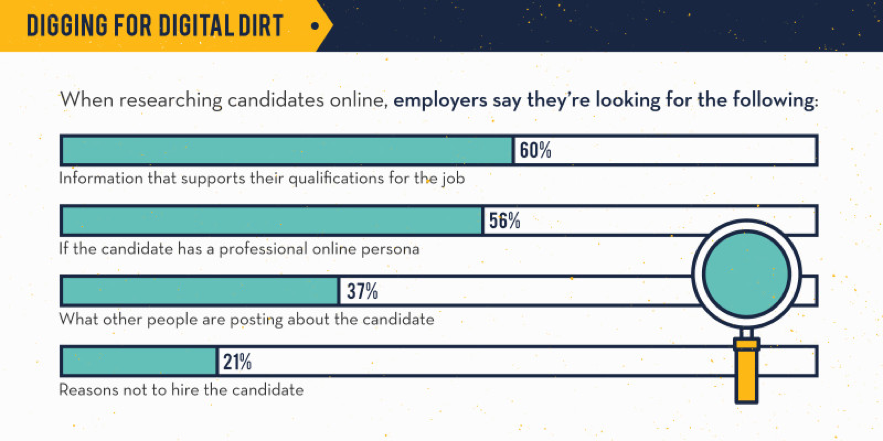
Why do we feel the need to post even the most minute details of our lives on Facebook, Instagram, Twitter, and the dozens of other social media platforms? Because social media is now a part of our daily lives and without we feel lost. What users don’t realize is that everything they post is a reflection of them…the good, bad, and ugly.
For employers, this seems like a treasure trove with social media being the perfect place to begin a background check. And every once in a while you hear stories pop up of applicants losing out on opportunities because prospective employers discovered something incriminating on their social media pages.
However, employers now need to think twice before checking applicants’ social media pages for background information. Why you ask? Let’s dive deeper into this issue.
Protected Information
Title VII of the Civil Rights Act of 1964 prohibits discriminating against people in employment. Particularly, it outlaws discrimination on the basis of color, race, gender, religion and national origin. This makes it illegal to deny someone employment on the basis of these characteristics (classified as “protected information”).
Visiting an applicant’s social media page is almost guaranteed to provide access to protected information. The pictures and posts most often reveal an applicant’s gender, race, color and so on. Just accessing this information is a breach of anti-discrimination laws. If an applicant finds out and sues the employer, it becomes extremely difficult for the employer to claim that the information did not play a part in their decision making.
If you really must conduct a social media background check, your best option is to have a third-party person screen applicants based on specific criteria for jobs. This way, hiring managers can make their decisions about applicants without knowing characteristics like race, ethnicity or marital status.
False Image/Mistaken Identity
What happens when a social media background check comes back squeaky-clean? Nothing embarrassing, unethical or illegal is found…does this mean that the applicant is flawless? Obviously no, everybody knows that people can create multiple social media accounts.
Most people who behave in questionable ways online often create pseudonyms, accounts with no relation to their actual names. This factor reveals another flaw in conducting social media background checks. Because people mask their identities online, the check can reveal nothing incriminating. Meanwhile, the applicant can be far from squeaky clean.
Another problem with running a search is the possibility of mistaken identity. How do you know that the John Smith you’re looking at is the same one applying for a position? If there are multiple accounts with similar names the risk of misidentifying the person, and thus making a wrong decision is quite high.
Even when the account contains personal details and pictures of the applicant, this doesn’t mean that it is owned and run by them. There have been numerous cases where people – with the sole aim of malice – have created accounts in the names of other people. These accounts are often filled with enough personal details to make them look authentic. They are then peppered with racist, misogynistic, pornographic or other kinds of content designed to make the person look bad.

What Can Employers Do?
There are so many legal issues to avoid when using social media in the candidate screening processes, some HR professionals might wonder whether it’s worth all the trouble. The answer is yes—if it’s done carefully. Social media can expand the pool of applicants and shed valuable light on job candidates—when a disciplined approach is used, experts say.
“The benefits of using social media in recruiting are clear,” said David S. Baffa, a partner with Seyfarth Shaw in Chicago. Although it’s true there is a potential for costly lawsuits against employers who misuse social media, “most of the stuff you hear about potential risks, I haven’t seen it play out in litigation.”
The biggest concern with using social media in the hiring process is discrimination. Social media provides employers with information that they might not obtain otherwise or might not obtain until they conduct a face-to-face interview. Once the process moves to the screening phase, have someone other than the employment decision-maker do the screening, advises Jason Morris, president and COO of EmployeeScreenIQ in the Cleveland area. “Create a firewall between this person and the decision-maker,” he said, particularly if the screening will involve social media sites.
The screener should look online for certain red flags such as hate speech, violent tendencies, or drug use that would have a direct bearing on the candidate’s potential job performance. Employers should keep in mind that background-screening companies that use social media sites are subject to the provisions of the Fair Credit Reporting Act, under which applicants must give permission for pre-employment investigations.
Diversify the Applicant Pool
Another problem with using social media—particularly LinkedIn and Facebook—is that these sites have lower percentages of Latino and black users than are in the general population. That puts the burden on employers to widen their job searches through other means, such as job boards, newspapers, magazines and job fairs. Experts urge organizations to post notices on their websites that they are equal opportunity employers and that they seek a diverse pool of applicants from many sources.
About Us:
We have been mining social media since 2007 for our clients. By utilizing best in class software programs, we offer a service called eChatter.
eChatter works with you to obtain your objectives in a fast, accurate and reliable facet. By keeping our strengthened principals, yet evolving with this industry, we lead in social media monitoring. Since 2007, we have been dedicated to providing our customers with the most authentic data.
We offer:
• Deep Web Scans
• Jury Vetting
• Jury Monitoring
• Social Media Background Checks
www.e-chatter.net
(866) 703-8238